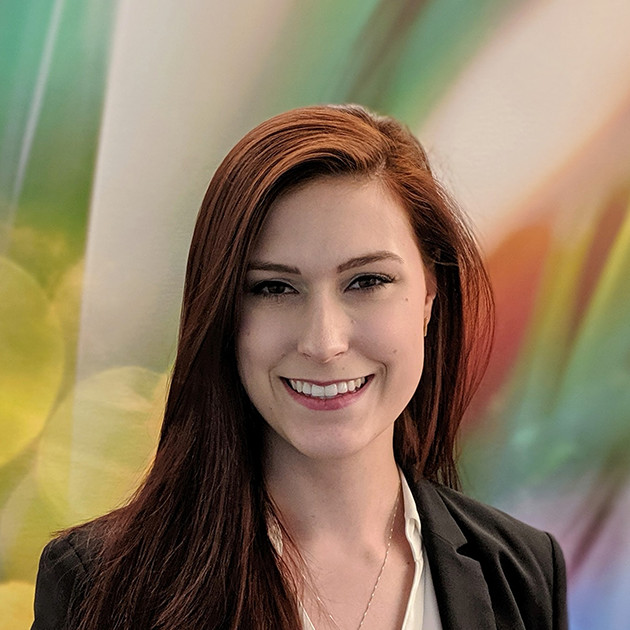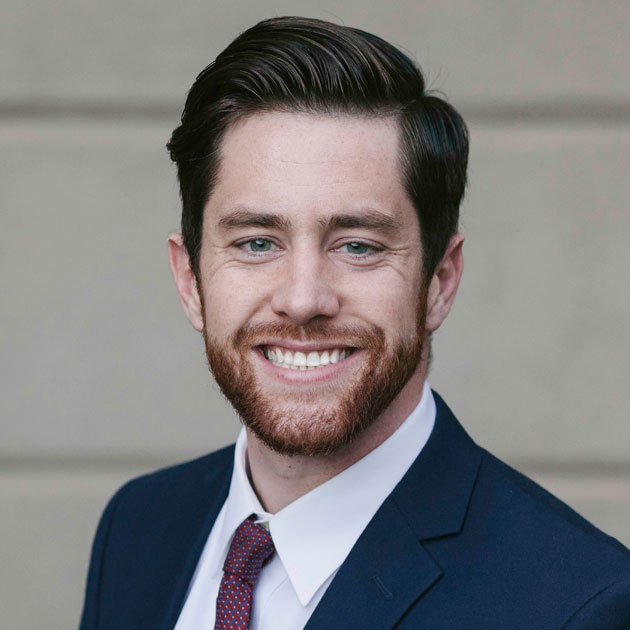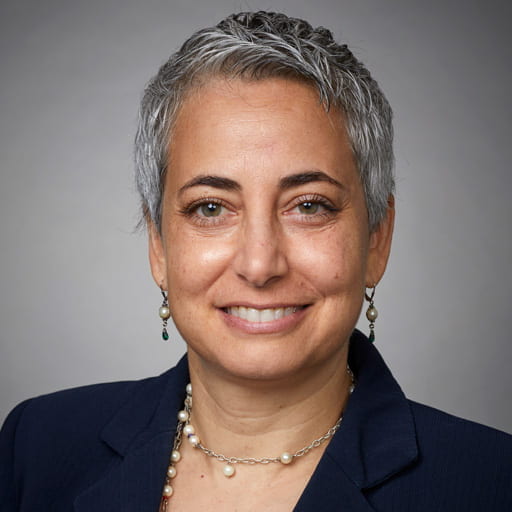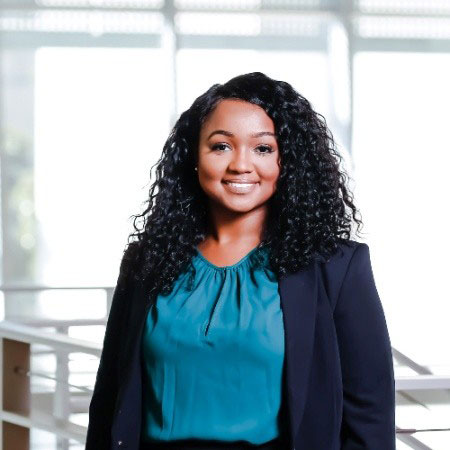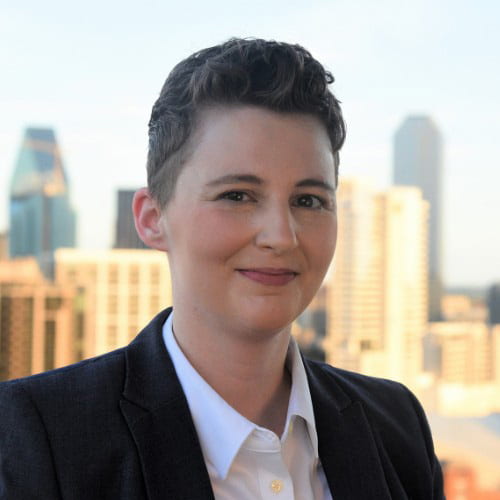
Rebecca Brooks, MBA’10, is a senior data analytics manager at McKesson. She joins host Dr. Monica Powell, senior associate dean and dean of graduate programs at the Naveen Jindal School of Management. The former sculptor who became a barista and then a truck driver discusses how her MBA degree helped her transition to a radically different career as a data analytics professional at one of the largest healthcare companies in the world.
Transcript
Introductory music plays up through Monica’s introduction.
[Jimmie] This is yet another MBA G.O.A.T. A podcast featuring conversations with the greatest of all-time MBA alumni from the Naveen Jindal School of Management at the University of Texas at Dallas. We are here to celebrate the outcomes of graduate management education and to identify remarkable examples of how the MBA program here at the Jindal School has transformed the lives of our alumni. Now, here’s Dr. Monica Powell, Senior Associate Dean and Graduate Dean at the Jindal School. Take it away, Monica.
[Monica] Well, hello there, Folks out in podcast land, I am so excited about the guest we have today on the podcast. It is my pleasure to welcome Rebecca Brooks. (Music has faded away.) She brings the most amazing story of once being a truck driver to now being a senior analytics leader for McKesson. So, welcome, Rebecca.
[Rebecca] Thanks for having me.
[Monica] Does it, does it seem odd to come back into the Jindal School? I mean you are here pretty regularly as an alum.
[Rebecca] Yah, you know I am, I am part of the local Dallas Chapter of Internal Auditors and they love to have meetings here, so it feels like I am, I am here a lot, anyway.
[Monica] So, you, you don’t object with the University’s growth and the school’s growth and aren’t too challenged by parking lot?
[Rebecca] Well, it is nice to have coupons (Monica laughing), so that uh, so that makes it easier.
[Monica] (laughing) that helps, that helps the cause. (Rebecca chuckles softly (You know, I’m so glad that you brought up ah the auditor in you. I think it’s really fascinating that um, if I remember correctly before you became an MBA student, um you were an artist?, photographer”, sculptor?, (questioning sound in voice)
[Rebecca] Yes
[Monica] truck driver?
[Rebecca] Yes, all of those things.
[Monica] OK and if I, and if I also remember correctly, you did your undergraduate degree at TWU in fine art. Right?
[Rebecca] Yes, yes
[Monica] So, so how does one who comes with that type of background soon develop the desire to get, obtain, ah complete and use an MBA in the most amazing way that you have. We haven’t even talked about where you are today. But, can you talk a little bit about how you thought about getting an MBA as an option to transition who you were or thought you were at that time?
[Rebecca] Yah, um so the yah I was, I was an art student and uh I got my bachelors in fine art in um sculpture, photography, mostly sculpture, so metal working and that kind of stuff, woodworking. And um, I couldn’t find a, an art gig, but I had been working through, working at Starbucks throughout my undergrad and so stayed on there and was going to go through their management training program. They were you know wanting me to go through it already I sat down and graduate first and then maybe. And uh, so when I graduated and had to put my money where my mouth was, so I started through that. That was in 2008 right around the time that they closed 600 stores in Texas and did not need additional managers or assistant managers for the store. And so, I was, you know, going to be stuck in this, in this, in this job um for a while, and so I decided to quit and become a truck driver.
[Monica] Wow!
[Rebecca] So, uh I which actually I had always wanted to since I was a little kid I thought you know big rigs were really great and wanted to try it and so I did.
[Monica] So how long did you drive the truck?
[Rebecca] Oh, it would have been just under a year.
[Monica] Wow, I think that’s I think there’s another great podcast (Rebecca laughs) in that background right there. But, today, ah, I think our audience will just be amazed, enthralled, and standing in awe of the fact that you are at McKesson Corporation, that you are the data analytics senior manager, ah which means you are driving how they are using analytics in an auditing capacity at McKesson because you went on to do several internal audit jobs when you graduated. You graduated in December of ’10, right?
[Rebecca] Right, yes
[Monica] So, so woe, I mean you, you totally redefined who you were. I mean you took a, a background that isn’t typically thought of as a pre-background to an MBA and you harvested it into this amazing um analytics trajectory with an emphasis in auditing. So, let me ask you a question, so you during your MBA program, you got hooked into the auditing concentration in the MBA program. Now, that’s an interesting transition from being somebody who is, who thinks like an artist and tends to think about solving artistic problems. It sounds like you transitioned solving artistic problems into maybe solving auditing problems. So when you made that transition and you found auditing, then how did you use that to progress your career?
[Rebecca] So, I, I mean, I’ve always said that I’ve, I’ve been too analytical for my artist friends and too artistic for my analyst friends. (Monica laughs) So, uh actually internal auditing is the perfect in-between because um, even though auditors get a bad, a bad rep for have, for being boring, number-crunching you know introverts. Ah, in fact a lot of what internal auditing does is, it work, involves, good communication skills, working with other people getting them to tell you what is going on, what’s wrong in their process and so you can, you know, help them improve it. And so, my impression of internal auditors was the same as most people’s which you know, so when, when one of my classmates said, “Hey, do you want to come to the student club?” I was uh, hard pass. “Uh, I don’t think that sounds right for me,” but uh the more that, the more that he talked about it, the more the does sound like just what I want to do, help organizations solve problems, and uh, you know learn a little bit about a lot of things, but never you know jack, master, or What was it? Jack of all trades and master of none.
[Monica] Yah, exactly, Well, I t sounds like you really found your home in using your pre-prescribed artistic thinking and then applied it in an auditing way. And I understand that, that at McKesson, they kind of charged you with the task of trying to use analytics in an, in an auditing way. And, is that, is that something McKesson has done before or is that something that industry in general is starting to do and then? How does, how do you lead that effort inside of McKesson?
[Rebecca] Sure, I’ll start with the industry question first. Da-Data analytics, data science, um, um, data visualization, they’ve been trending I think for you know probably the past decade. But, that’s been the trend in the industry. Ah, McKesson recently as a, as a company started to invest well maybe in the last 4 years or so started to invest more in, in data analytics and ah data science. So that because it is a, it is a enormous corporation for those who don’t know McKesson, it’s a Fortune Six company. Um, I call it the biggest company no one has ever heard of because it’s mostly B to B, ah, but the next time you go to the doctor’s office you will see our tongue depressor or gloves ah cause we, we distribute medical supplies and, and pharmaceuticals. And, with that in mind, it is a very data-rich company. So, McKesson collects data, we have a lot of data and so that’s why they started to invest in it. Well, uh, kind of separate from, from McKesson as a company, the Internal Audit Department had some fits and starts trying to build the auditing analytics capability and it is actually something that the auditing profession is struggling with, too because typically the, the skill set that you hire for with an internal audit is accounting background or business background, not as much on the um technical background, and so I think that’s, that you know it has been one of the auditing profession is struggling with it and at McKesson they were no exception. So, my VP, my vice president when she got the vice president role, said, “I’m wanna change this and actually dedicate somebody to building our capability.” It was always people’s part-time job, to where you know go and do your auditing and then on top of that see if you can work in some, some data analytics and so she had the foresight to, to say, “This is not you know feasible in the long run. Ah, we need to, we to actually need to have someone have this be their fulltime job. I had expressed to her in the months prior that I was interested in doing more with data analytics, that I was interested in, in learning about the data science, which is the you know the machine learning and artificial intelligence, all that fancy stuff. And so, McKesson ah had a program, a data science program where they took McKesson employees who knew the business, who know the data and then taught them the data science. And so, after I you know after I went through that program and um she was, she put her strategy together for this, she asked me to the a data science senior manager and made that my fulltime job as to build our capability in that regard.
[Monica] Woe!That is an amazing story. You know, you said one thing in there that just made my ears just like stand up or get pointed or something, but you said that you raised your hand and so um typically, artists and those that come out of the fine arts world, you know, they are people that are very connected to their brain and what’s going on and there’s the stereotypical idea that they’re introverted and they are incredibly introspective. So, in the MBA program, it sounds like we helped you develop some of those interpersonal skills that gave you the confidence to actually raise your hand.
[Rebecca] Yah
[Monica] Uh and say, “I want to do this.” So can you talk just a little bit about just kind of that professional development growth in the program and how that really changed the artist into the auditor into the analytics kind of guru?
[Rebecca] Yah, um so, I think the biggest part of it is, is the vocabulary. I mean, nobody will take you seriously if you don’t talk the talk, if you can’t participate in the business meeting. It’s ok if you don’t know everything, but if you, if you don’t know a debit from a credit, or a you know, a mergers and acquisitions you know.
[Monica] Can’t read the balance sheet
[Rebecca] Yah, you know can’t read the balance sheet (a little laughter from both ladies) yah, and you know all of that stuff. You will be easily dismissed in that conversation and so one of the biggest things was just the knowledge, the business knowledge. The other aspects that I really got a lot, a lot out of the program was the because it was a cohort, we, I had the same classes with the same group of 40 other students, the core classes anyway, and and ah I got to know those people, so it gave me the confidence to, to we were all learning together and so I knew nobody knew everything, but I knew the right questions to ask. I, I knew that I had people that I could reach out to during the program and then even afterwards if I had questions and people who had a different focus, maybe marketing or supply chain and I could always say, “Hey, does this sound right to you?” and I’m, I’m gonna go and talk to the so and so in supply chain and I don’t want to sound like a buffoon.
[Monica] Well, I would say that you’ve conquered that monster and ah being in the role that you’re in now it sounds like you’ve earned every bit of the respect of the organization (music begins) an created an opportunity for yourself to, to really grow your career. And, I’d like to think that the MBA program has played a big part in making that happen.
[Jimmie] This episode is brought to you by the UT-Dallas MBA program, top-ranked nationally and in Texas. The UT-Dallas MBA combines a robust core with 13 concentrations. You have an option to add a second Master’s degree and your choices for that include five STEM designated programs. The MBA program has fulltime, part-time, online and other formats. They give you flexibility to fit your MBA education into your busy schedule. The skills and training you will receive are what top employers are looking for. For more information, visit us online at jindal.utdallas.edu/mba
[Monica] You know when you were a student every time, um and, and I know you graduated in December of ’10, it’s pretty amazing what you’ve been able to do and what you were able to take advantage of while you were a student. Every time we asked students to volunteer, Rebecca raised her hand. (music stops) Your class did a big project with the KIP Academy. So can you talk a little bit about the dynamics of the culture inside of the MBA program and while it was all focused on learning and growing your career and improving your outcomes, that there was a sense of community and connectedness, a sense of belonging to the program?
[Rebecca] Yah, absolutely, so I think the MBA programs have a, have a reputation, some MBA programs anyway have a reputation for um being cut-throat where everybody is competing for the top grade. This is not that kind of program and one of the very first things we that, that we did as a cohort group was elect officers ah for various areas like community service, social interaction with each other.
[Monica] That was the party chairperson (both chuckle)
[Rebecca] Yes, That was the party chairperson, exactly. Ah, they were very successful. (Both laugh) But the and so I, I volunteered for the um the community service aspect of it because that has been important to me and ah (she had a smile in her voice) worked with some kids um in the, in the charter school program called ah KIP Truth and the, the goal of that charter school was to take kids that were under performing, have them work extra hard, and a and then ah get them into higher performing high schools and eventually into college. That was the, that was the overall goal and ah I thought that we had a talented group of students, ah MBA students that could help them with some interview skills and other kind of business type skills that would help them give them a little bit of additional polish when they go into those high school interviews. And so, we ah organized a service day where the ah students came to campus. They got to tour all of the neat things including the ah motion capture lab and then, ah we did some, some kind of team building activities and later in the year did some interview prep sessions with them.
[Monica] Oh, that sounds like that was a whole lot of fun. So, if you were going to talk to those prospects that are out there that are listening to, to us today and thinking about, “You know, I think that an MBA is a good investment. I’m not sure if I can make it, it turn it into something amazing.” You’ve, you’ve done that Rebecca. You are a good example of making that happen ah with a non-traditional background. But, what argument would you make to someone that an MBA is really worth that investment either in a fulltime capacity like you did stepping out of a job market going fulltime and even a part-time or online capacity, how is the MBA still relevant today for you personally, for you inside of McKesson and just in general?
[Rebecca] I think that’s a really good question and I think if somebody you know who is listening or, or somebody that I know asked me, “Is it, is it worth it? Should I go get an MBA? What should I do?” Um, it’s really kind of a personal decision because are you the kind of person that wants to become a, you know a leader in an organization? Do you have strong opinions and, and a do you already have a, a strategic kind of mindset where you wouldn’t be happy doing the, the same thing over and over again? If that’s the case, then I think the MBA would be the better way to go. But, it isn’t for everybody because there are some folks that would rather you know, “I wanna do my job, I am, I wanna to close the books every month, and um know exactly what I am going to be doing the next quarter and the next quarter after that” And I would for those people I would say, well you know probably MBA is not the best.
[Monica] So, maybe an MS in, in a specific function
[Rebecca] Right
[Monica] might be a good deep dive for them to go in. It was, It’s really interesting because I think there is a little bit of a struggle in the marketplace for people to decide if it’s worth that investment. I think, because the MBA did get a historical bad rap 10 years ago. I think that is and people do have options. Um, I think people look at it differently. So, Rebecca, if you look back what are your, what are your fondest memories of the program? I know there was a lot of stress and a lot of late night studying, but if you look back, what really makes you smile? And, what really gives you joy?
[Rebecca] Um, That’s easy, that’s uh my classmates. Um, they’re, it was a fantastic group of, of students. It was, even though it was stressful, we were all there to help each other. And so the late nights, you know it was, it was late nights with people that I enjoyed spending late nights with. (Monica laughs.) And in fact, ah, this weekend I’m going to be spending some more time with some former classmates, ah, so, one of Gaby Goodman who is coming into town.
[Monica] Awesome
[Rebecca] And so, we are all going to get
[Monica] She’s terrific
[Rebecca] Yah, she’s great! You should see if you can sneak her into this. She’s coming in on Thursday.
[Monica] Yah, gotta go, let’s go after Gaby.
[Rebecca] (Ha, ha) But, she’s coming into town, so we’re, we’re going to get together. And so, the relationships that I made during the, during the program were probably the best part of the, of the program. In fact, ah Alex Wise was, was the one who got me the job at McKesson. He put in my resume and, and got me the interview, so
[Monica] So that’s what it’s about. It’s really about getting a whole bunch of knowledge, getting life-long friends
[Rebecca] Yah
[Monica] and an incredible network that pays dividends the rest of your life.
[Rebecca] Exactly
[Monica] Yah, Nothing, nothing wrong with that. Um, if you had a, a favorite memory of a professor
[Rebecca] I have a lot of good memories of classes and they really stretched your brain and, and made you think in some areas, especially, especially like Charlie Hazzard. Um, I always enjoyed his class. Ram Rao
[Monica] Marketing professors – Both of these professors that you mentioned are still here at the Jindal School.
[Rebecca] Fantastic
[Monica] Yah
[Rebecca] Um Rao’s marketing classes were probably the, the most fun when we got to do some case studies with real companies that, that ah in the past where we can dig in and say all the mistakes that they made and what they should have done different.
[Monica] It’s great to learn from everybody else’s failure, isn’t it?
[Rebecca] It is. (Monica quietly laughed)
[Monica] Nothing wrong with that at all. Well, terrific. It has just been a delight to have you back in the school. Uh, It seem like yesterday you were a student here and I loved hearing that you’re connected to your classmates. We tell students all the time when they come in for orientation that this is kind of your last opportunity to make really good lifelong friends. People that will help you when you are looking for a job. People that will be there when you are having a family crisis. That it is not just about the degree, it’s also about the association with remarkable people, remarkable faculty and a remarkable place doing really remarkable things. So, I’m glad to see that you’ve been a, a wonderful recipient of that and we’re just so am, so incredibly proud of you. And, you made an internal audit career happen for yourself, you have gone on from JC Penney’s to McKesson and had three promotions and you know, we tell our prospects all the time that if you, if want the knowledge, you want the understanding, you want the communications and the confidence, (music begins) Come be a part of this journey and then you own, you own the potential outcomes as opposed having to you know give that up to someone else. You get to own your journey. And, and we are really proud of you Rebecca and we thank for you coming to be a part of the G.O.A.T.
[Rebecca] Well, thank you. I, I appreciate you taking, taking the time, to, I appreciate you inviting me, too.
[Monica] Well, terrific. Thanks so much. Well, will be in touch soon.
[Monica] Thank you so much for listening to today’s podcast I hope that you were inspired by the words you heard from one of our Greatest Of all Times MBA G.O.A.T.s . If you were inspired to think about getting an MBA degree, I hope that you will be in touch with us. Give us a call, drop us an e-mail, hop on our website. Be in touch with us so that we can help you make a difference in your future. We look forward to hearing from you.
[Jimmie] Thanks for listening to this episode of yet another MBA G.O.A.T. podcast. Join us online at mbagoat.com to find episode notes, links and more. Be sure to subscribe to yet another MBA G.O.A.T. podcast on Apple podcast or your favorite podcasting app. If you like what you hear, please leave us a five-star review. That will help spread the word about the podcast and Jindal School’s MBA programs. To learn more about the Jindal School’s MBA programs, go to jindal.utdallas.edu/mba (Music continues)

